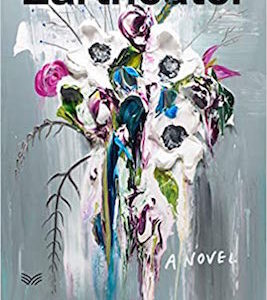In the spring of 2013, I began work on my fifth novel, The Intrusions. The story was structured around the protagonist visiting his mother in hospital. She’s just had a stroke. A year later, halfway through the writing of the book, my father suffered his first stroke
It would be easy, and certainly comforting, to chalk this up to coincidence. A large part of me still believes that—but another part, that weird superstitious writer part, isn’t so easily fooled. After all, this wasn’t my first encounter with the peculiar eeriness of writing fiction.
Many authors are praised for the prescient nature of their work—from Philip K Dick’s techno-fascists through Ballard’s vision of a resurgent nationalist populism to DeLillo’s premonitions of a terror attack on the World Trade Centre in his 1977 novel, Players. This year saw the publication of Emma Donoghue’s Spanish Flu novel, The Pull of the Stars, as well as Lawrence Wright’s spooky pandemic thriller, The End of October.
These writers, however, were aiming to say something about future trends and that’s not quite what I’m talking about. It’s never the stuff you think you’re so clever at envisaging that comes true, but the small inconsequential details you barely give thought to. And it’s not the world you’re predicting, but your own life.
Write what you know. It’s the most common piece of advice given to creative writing students. But fiction is stranger than truth and, as many writers attest, when you try to write what you know, paradoxically, you often end up writing what you don’t know you know.
Of all possible maladies, why did I choose a stroke?
I knew my protagonist’s mother would be in hospital and the book would partly deal with him coming to terms with her mortality. I didn’t want to tempt fate by giving her cancer or a heart attack—those were too close, too probable. I chose a stroke because it seemed so utterly remote. No one in my family had suffered one. None of my friends had had one or seen their parents felled by one. To me, it was as unlikely as Pleurisy or the Shaking Sickness.
Did I somehow know?
I tell myself, of course not. There is no magic or prophecy in writing. And yet—not just for me but for many authors I’ve spoken to—life, perversely, often seems to mimic art rather than the other way around.
In my debut novel, the main character injures his ankle on Oxford Street, leaving him on crutches. A year after handing in the book, I was walking down Oxford Street when I was attacked by a group of teenagers. They punched me in the head, knocked me out, and stamped on my ankle, breaking it. I attended my first book launch on crutches.
My second novel dealt with dead brothers. My little brother died midway through the writing.
But a stroke? It seemed so weirdly specific.
Obviously, on one level, we all comprehend our parents will die. It sits undigested in our brains, bubbling beneath our days. Writing, when it’s going well, opens a tap in our minds, releasing deeply suppressed fears and anxieties onto the page. Somewhere, far down in my subconscious, I must have dreaded this very outcome. It’s a version of Einstein’s spooky action at a distance, but for sentences rather than electrons.
I began to shuttle from hospital to work, just as my protagonist did. It scared me how accurately I’d imagined the sickbed scenes. I’d come back from the ward to write about the ward. I would stare at the page and feel a curious vertigo. There was nothing much I could add. I’d somehow intuited everything I’d be feeling in these circumstances and this very lack, the inability to transform my day into fiction, gnawed at me and left me profoundly uneasy.
When the doctor took me into a corner of the ward one day, I knew precisely what was about to happen. I tried to let her words sink in as I stared at the rain streaking the windows. It’s one of those moments we all live in dread of but what made it doubly unsettling was that I’d written this scene a couple of years earlier in The Intrusions. Now, I found myself having the exact same conversation. The doctor told me they’d run out of options. Dad’s brain had been deprived of oxygen for too long. She said that even if he recovered he’d never be able to live an unassisted life again. They’d tried everything but he was no longer responding.
I asked her if there was nothing she could think of—no experimental therapy or last-minute miracle—but the words felt false even as I said them because I was only repeating what I’d written two years earlier.
Ironically, The Intrusions was the only novel where I made a conscious attempt to steer clear of history and family. I thought that in writing a book about some of the possible ramifications of the Internet, I was writing a novel about the future, not the past. It was only when I’d finished that I realized everything I’d written about hacking and social media had already caught up with the novel and it was only in the hospital scenes that I’d been writing about the future.
And it began to spook me a little. I knew I hadn’t conjured the stroke out of words, yet I felt a strange trepidation when I began to write again, a fear that whatever awful events I made my characters go through, I would have to endure too.
***
Can you write your deepest fears into existence? My strict rational self says no, yet there’s something about writing that scares us a little. We’ve always suspected that writing has a power and purpose beyond mere communication. William Burroughs is probably the most famous progenitor of the theory that what you write becomes your life.
A waiter at the Moka espresso bar in Soho treated Burroughs disrespectfully. He wrote a curse, cut it up and recorded it on tape. A week later, the bar closed down. Burroughs, never one to rationalize a strange experience, was convinced he’d instigated it: “When you experiment with Cut-Ups over a period of time you find that some of the Cut-Ups in re-arranged texts seemed to refer to future events. I cut-up an article written by John-Paul Getty and got, ‘It’s a bad thing to sue your own father.’ This was a re-arrangement and wasn’t in the original text, and a year later, one of his sons did sue him … We had no explanation for this at the time, it just suggesting that when you cut into the Present the Future leaks out. Well, we certainly accepted it, and continued our experiments.”
For Burroughs, the predictive nature of writing was woven into the fabric of language itself. Burroughs was, of course, notorious for his crackpot theories and this seems a little too close to wishful thinking. In my experience, it’s never the good stuff that comes true.
Something closer can perhaps be seen in the play(s) Shakespeare wrote the year before his son’s death.
Two plays have been traditionally ascribed to 1596—The Merchant of Venice and King John. We don’t know the order in which they were written (and there’s controversy over the dating of the latter, many citing it as an earlier work) but both plays strikingly do contain scenes depicting a parent’s grief over a dead child. In Merchant, the subject is treated humorously, while in King John the same situation takes on a much more tragic aspect.
If, as it seems, King John was written before Hamnet’s death, it seems conspicuous in its eerie prescience. Of all Shakespeare’s works, it’s not only the play most suffused with grief but also the only one where a child is placed at the moral centre of the drama. The original character was older and Shakespeare changed his age to roughly that of his own son. The play spins around the gravity of a child’s death, the whirlpool of grief that eventually consumes most of the characters. Had Shakespeare managed, as many authors do, to jump the life to come, and write scenes he would end up living through?
Or take Roman Polanski. In 1968, he makes a film dealing with the anxieties of pregnancy, a movie in which the main character’s baby is forcibly taken from her by a satanic cult. A year later, Polanski’s pregnant wife, Sharon Tate, loses her baby to another cult, Tex Watson proclaiming, “I am the devil and I am here to do the devil’s work” as he entered the house on Cielo Drive.
Nick Cave’s son died halfway through the recording of his 2016 album “Skeleton Tree”. On release, it sounded like a deeply personal exploration of grief and yet Cave, in many interviews, said that the lyrics had all been written before his son Arthur fell from a cliff in Brighton. The album’s first lines are particularly striking: “You fell from the sky / Crash landed in a field / Near the River Adur.” (The River Adur runs very close to Brighton). The rest of the record was equally suffused by grief and sorrow, especially the haunting Girl in Amber (“I knew the world it would stop spinning now since you’ve been gone / I used to think that when you died you kind of wandered the world / In a slumber till you crumbled, were absorbed into the earth / Well, I don’t think that anymore”) and Anthrocene’s insistent refrain of “All the things we love, we lose”.
But how much of this is us seeing patters after the fact? We’re very good at spotting coincidence but not so great at perceiving its opposite. A novel is composed of roughly ten thousand sentences. That’s a lot of potential material. It’s no surprise that a small percentage of this will come true, especially as we tend to articulate our deepest fears in the guise of character and plot. There are not that many options for depicting a life. People get sick, people die. There are only so many diseases.
And yet, the specificity of these instances continues to gnaw at me. If it were just one occurrence, I could easily and rationally explain it away, but the accumulation across novels frightens and intrigues me in equal measure. Some days, I fantasize about writing children’s books, novels where nothing terrible happens to anyone—but bad things happen to us all and, ultimately, there are no happy endings, which, I suppose, accounts for why writers spend so much time and effort in providing them.
*


















